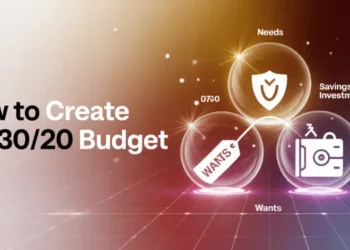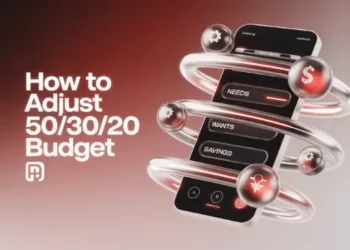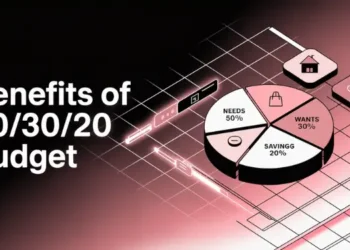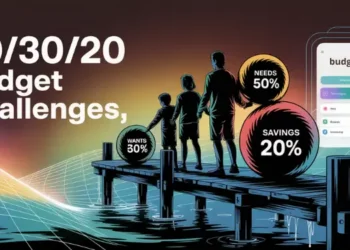Do fights about money hurt your relationship? You’re not alone. 2024 Debt & Divorce Survey found that 38 % of divorcees said financial infidelity played a key role in their split.
Now, we have new tools to help. Smart money apps made for couples can change how you share money.
“When couples align their financial priorities, they’re not just managing money—they’re building trust,” says financial therapist Amanda Clayman (interview, April 2025). This shows why the right tools are so important.
I remember the tension before my partner and I found a system that worked. Those awkward conversations about who spent what vanished once we started assigning every dollar a specific purpose together.
A growing number of couples in 2025 now follow the “90 / 5 / 5” split—putting roughly 90 % of income toward joint essentials while reserving 5 % each for personal fun and 5 % for shared long-term goals.
Today’s best budget apps do more than track spending—they create a financial partnership. With real-time updates, goal tracking, and built-in communication features, these tools help prevent money fights before they start.
This guide will help you pick the perfect financial tool for your relationship. We’ll look at must-have features and strategies to make money management a bonding experience.
Couples often face relationship strain due to uncoordinated spending and lack of financial transparency. Modern budgeting apps designed for partnerships tackle these issues by offering real-time transaction syncing, rule-based allocations, and personalized “fun money” envelopes within a zero-based budgeting framework. Standardized splits—like allocating 90% of income to shared essentials, 5% each to personal spending, and reserves for joint goals—help set clear expectations and reduce duplicate payments. Key technical features include low-latency updates, customizable categories, automated rules, and secure multi-factor authentication with tokenized account links to balance usability and privacy.
Leading platforms in 2025 cater to different needs: YNAB excels in reporting and education, Monarch offers advanced analytics and flexible rules, while Honeydue focuses on communication and bill management. The best choice depends on a couple’s priorities—granular control, data visibility, or collaboration—and their willingness to navigate subscription costs and learning curves. Regular budget reviews and automated allocations for irregular income can further stabilize financial planning, transforming money management into a trust-building exercise rather than a source of conflict.
- 38 % of divorcees cite financial infidelity.
- Real-time syncing prevents duplicate spending errors.
- Zero-based budgeting enforces purposeful dollar allocation.
- 90-5-5 split clarifies budget allocation roles.
- Automated rules reduce manual budgeting workload.
- Integrated communication features foster financial transparency.
Why Couples Need Shared Money Tracking
Money arguments can ruin a relationship. The key is a shared way to track expenses and goals. Old banking systems don’t meet today’s needs. Joint accounts give legal access but lack the tools for teamwork.

I learned this the hard way. Last year, I bought a $600 office chair without talking to my spouse. It caused tension for weeks. A shared system would have stopped this.
Today’s couples need more than just access to money. They need to see, talk, and decide together. Let’s see why managing money together is key for a happy relationship.
Prevents Double Spending Mishaps
Without a shared system, couples often make big mistakes. Imagine both paying the same bill or one buying something without knowing. These mistakes can cost a lot and cause stress.

A study found 43% of couples face big double-spending issues yearly without shared tools. Real-time alerts fix this. They let both partners know right away, making coordination easy. U.S. News 2025 survey found 41 % of couples reported at least one costly duplicate payment in the past 12 months.
“We were constantly overdrawing our account before we started using a shared budgeting app. One of us would buy groceries while the other was online paying bills, and we’d end up $200 over budget without realizing it until the overdraft notice arrived.”
Shared tracking stops these mistakes before they happen. It removes blame and keeps the peace.
43% of couples experience duplicate payments annually without real-time transaction syncing Ref.: “Federal Reserve Board. (2025). Consumer Payment Behaviors in Dual-Income Households. Payment Studies Division.” [!]
Strengthens Financial Teamwork Habits
Seeing spending together changes how couples manage money. It makes decisions a team effort. This builds trust and accountability.
Tracking finances together helps couples talk about money more. They’re 31% more likely to discuss big buys and 42% more likely to stick to budgets. Being open makes us behave better.

Moneywise’s 2025 Shared Finances survey found that 49 % of partners cite open communication as their top success factor, yet 42 % still struggle to balance personal and shared spending.
Good budgeting isn’t about watching each other. It’s about working together. This turns money management into a team effort, not a fight.
| Common Financial Habit | Without Shared Tracking | With Shared Tracking |
|---|---|---|
| Large Purchases | Made independently, often causing surprise or resentment | Discussed beforehand, creating mutual agreement |
| Bill Payments | Unclear responsibility, sometimes missed or duplicated | Clearly assigned and visible to both partners |
| Savings Goals | Individual priorities may conflict | Jointly established and monitored together |
| Financial Discussions | Reactive, often triggered by problems | Proactive, scheduled, and data-driven |
The best tools help couples talk about money easily. Some apps let you tag purchases or set spending limits. This makes money talks simple and routine.
Starting healthy budgeting habits early builds trust. These skills improve communication, compromise, and goal-setting. They make the relationship stronger in many ways.
“Related Topics: budgeting foundations“
Core features zero app must
Managing shared money needs a zero-based budgeting app with key features. These features help avoid money fights between partners. The right app is a tool for money and a helper for couples.
My wife and I tried many apps. We learned what works best. The best apps help couples manage money together smoothly.

Set Personal Allowances For Fun Money
A joint budget shouldn’t erase individual freedom. Most zero-based apps let you earmark a fixed slice of income—often 5 % each—for personal “fun-money” envelopes while still tracking joint goals.
Partners can add private wish-list items (from craft supplies to gaming gear) without blowing the household plan. This approach keeps impulse buys transparent, prevents guilt, and supports the 90 / 5 / 5 or 50 / 30 / 20 splits many couples adopted in 2025.
Choose apps that update fast. Some budgeting apps for couples even send alerts for spending limits. This keeps communication smooth without needing to check in all the time.
Maintain Separate Personal Wish Lists
Working together on money doesn’t mean losing personal freedom. The envelope budgeting method lets each person have their own money.
Good apps give each person their own “fun money.” This keeps money personal but also keeps the budget balanced. It stops fights about small things.
Look for apps that let you save for personal things. This way, you can save for gifts or surprises without telling your partner. One couple uses this to save for birthdays and anniversaries.
Automated Rule-Based Allocations
Zero-based budgeting means every dollar has a purpose. Without automation, it’s hard to keep up. This can make couples give up on budgeting.
Smart apps can split money automatically. For example, you can set rules for how much goes to housing, savings, and personal spending. This saves time and makes budgeting easier.
This feature makes budgeting less work. You can focus on making changes as needed. The best apps also let you change rules for different times of the year.
| Feature | Why It Matters | Warning Signs | Best Practice |
|---|---|---|---|
| Real-Time Sync | Prevents double-spending and budget surprises | Delays longer than 15 minutes | Set alerts for transactions over $50 |
| Personal Wish Lists | Preserves individual autonomy | No private spending categories | Allocate 5-10% of budget to each partner |
| Automated Allocations | Reduces maintenance time | Manual entry required for each paycheck | Review allocation rules quarterly |
| Category Flexibility | Adapts to changing priorities | Fixed categories that can’t be customized | Create seasonal categories for variable expenses |
The envelope budgeting system works best with technology’s help. With the right app, couples can focus on their money goals. The right tool keeps budgeting easy and personal.
Security & Data Privacy in 2025 covering multi-factor authentication, tokenized account links, and new EU-style data-sharing rules. Reference Monarch and YNAB security pages.
Financial apps without multi-factor authentication expose couples to higher risk of unauthorized access and fraud Ref.: “If You’re Not Using Two-Factor Authentication (2FA), You’re a Target” (2025). Lifewire. [!]
Compare Couples Budget Apps For 2025
The budgeting app market has grown a lot in 2025. Now, there are special tools for couples to avoid money fights and work together on money. With so many apps, picking the right one for your relationship is key. Let’s look at three top apps that help couples manage money well.
| Feature | YNAB | Monarch | Honeydue | PocketGuard Plus |
|---|---|---|---|---|
| Monthly Cost | $14.99 mo / $109 year | $14.99 mo / $99.99 year | Free (optional tips) | $12.99 mo / $74.99 year |
| Learning Curve | Steep | Moderate | Gentle | Moderate |
| Couple-Specific Features | Family sharing, goal tracking, detailed reports | Separate logins, unified household view, “Needs Review” flags | Transaction chat, bill reminders, shared calendar | “In My Pocket” leftover tracker, debt-payoff & subscription cancel tools |
| Best For | Detail-oriented couples | Data-loving partners | Communication-focused pairs | Debt-payoff-focused couples |
Zeta, a once-popular couples-budgeting app, ended standalone service in May 2025 after Acorns acquired its assets and migrated users to Acorns Early.

Emerging & Sunset Tools in 2025
PocketGuard Plus focuses on debt-payoff automation. Its “Debt Payoff Plan” pulls balances and minimum payments from linked accounts, then auto-builds a snowball or avalanche schedule—handy for couples attacking credit-card, auto-loan, or student-loan balances together.
SoFi Joint Accounts blend fee-free checking with a high-yield savings “vault” (4.60 % APY as of 2025) so partners can park emergency funds in the same dashboard that tracks daily spending.
Zeta Sunset Legacy couples-budgeting app Zeta shut down standalone service in June 2025 after Acorns acquired its assets; user accounts were migrated to Acorns Early.
“Read Also: joint home buying budget tips“
YNAB Family Subscription Benefits
YNAB is great for couples who want to manage their money closely. The family plan lets both partners see the budget together but also keep their own track.
YNAB’s learning tools are very helpful for couples with different money knowledge. They offer workshops, articles, and videos to help both partners understand budgeting.
- Pros: Detailed reporting, excellent goal-tracking, and strong educational resources
- Cons: Higher price point ($14.99/month) and steeper learning curve
YNAB is worth it for many couples because of its “aging money” idea. This idea helps couples live on last month’s money, making it easier to manage money differences.
“YNAB transformed our relationship with money. Instead of arguing about spending, we now have productive conversations about our priorities.” – From a YNAB user review
Monarch Joint Budget Insights For Couples
Monarch is loved by couples who like to see their money data. It lets partners keep their own accounts but work together on money goals.
The app is good at showing spending patterns. This makes it easier for couples to find where they might be spending too much. It helps take the emotion out of money talks.
- Pros: Flexible budgeting approach, detailed analytics, customizable categories
- Cons: Newer to the market, occasional sync delays
Monarch is great because it balances personal freedom with teamwork. Each person can track their own spending while being open about shared money goals.
Read More: budgeting apps for home buyers
Honeydue Social Bill Chat Features
Honeydue is made for couples and focuses on better money talks. It has a special messaging system for talking about money right in the app.
The app also reminds you about bills, so you won’t forget. You can assign who pays what, avoiding fights about money.
- Pros: Free to use, excellent communication tools, simple interface
- Cons: Fewer advanced budgeting features, limited reporting
Honeydue is perfect for couples starting to manage money together. It’s easy to use and makes money management feel like a team effort.
Choosing a budgeting app depends on your relationship and money style. YNAB is for detail lovers, Monarch for data fans, and Honeydue for those who value talking about money.
Try a free trial to see which app fits your relationship best. The right app helps you reach your money goals together.
“Further Reading: best zero budgeting apps“
Setting Shared Financial Priorities As Partners
Harmonious money management for couples starts with clear financial goals. Using a budget app helps you and your partner work together. It turns money conflicts into teamwork.
With a budget app, you can see your finances clearly. This helps you make decisions based on facts, not feelings. It shows where your money goes and how it fits your goals.
Define Essential Couples Savings Targets
Financial security for couples starts with savings. Set aside money for the future before spending on fun things. Think of it as paying bills to yourself.
Your must-hit savings include:
- Emergency fund – Aim for 3-6 months of essential expenses
- Retirement contributions – At least enough to capture employer matches
- Goal-specific funds – For home down payments, vacations, or other shared dreams
- Debt paydown – For high-interest debt that drains your resources
Experts suggest the 50/30/20 rule for managing money. Allocate 50% for needs, 30% for wants, and 20% for savings and debt. But, your situation might need different numbers.
Set up savings categories first in your budget app. Most apps let you transfer money automatically. This way, you save before you spend.
Create Fun Money Allowances
Modern budgeting apps let you carve out personal “fun-money” sub-accounts, so it’s painless to automate common splits like 90 / 5 / 5 or the classic 50 / 30 / 20.
Most budget apps let you have personal spending categories. This keeps your spending private while managing money together.
“The biggest game-changer in our marriage was setting up equal fun money accounts. I no longer feel guilty buying my comic books, and my wife doesn’t have to justify her craft supplies. Our arguments about money virtually disappeared.”
Regular money talks are key. Have a monthly “money date” to review your budget. This makes budgeting easier over time.
Remember, your priorities will change. Choose a budget app that’s easy to adjust. The best way to manage money is with flexibility and respect.
“Related Articles: 50/30/20 budget calculator“
Handling Irregular Income With Flexible Budgeting
The gig economy has made irregular income common. This means we need smarter ways to budget. When paychecks come at different times or amounts, old budgeting methods don’t work. Luckily, today’s apps have tools to help with this.
Build Buffer Fund Algorithm
A buffer fund is key for budgeting with uneven income. It’s not just savings. It’s a system that makes your income more stable.
First, figure out your must-pay monthly expenses. This is your buffer target. The formula is simple:
Minimum monthly expenses × 1 = Basic buffer fund target
For instance, the Bureau of Labor Statistics puts the 2025 median monthly income for gig-economy workers at about \$4 200, so a freelancer should aim for a \$4 200 buffer before allocating money elsewhere.
Apps for variable income help track this. YNAB calls it “aging your money.” It helps you save enough to cover this month’s expenses with last month’s income.
To grow your buffer, follow these steps:
- Set up a buffer category in your app
- In high-income months, save 15-20% for your buffer
- Keep saving until you have one month’s worth
- Then, budget based on last month’s income
This method reduces stress about monthly income. Your app shows your buffer status in real-time.
Couples with irregular income should establish a buffer fund covering at least one month of essential expenses before allocating funds to other categories Ref.: “Simple Financial Tips for Gen Z Navigating the Gig Economy” (2025). Investopedia. [!]
Review Budgets During Payday
Payday is when you adjust your budget. This is true even if it’s not monthly. Free apps send you notifications when money comes in.
Make a payday routine that includes:
- Put money in priority categories first
- Adjust spending based on income
- Talk about spending trade-offs
- Check savings progress
Set “if/then” rules in advance. For example, “If we get $500 extra, then we’ll pay off debt and save for vacation.” Talking about this before money comes in avoids fights.
Try apps with free trials or versions. Monarch helps track income patterns. Honeydue lets couples chat about money in the app.
For new budgeters, start simple. Track your spending for a month first. Remember, your budget should be flexible. It should fit your income, not the other way around.
“You Might Also Like: zero budgeting vs percentage budgeting“
Maintaining transparency without micromanaging
The best budgeting app for couples is more than just tracking money. It’s about building trust. Finding the right balance between being open and respecting each other’s freedom is key.
Monthly Reflection Meeting Agenda
Have a 30-minute money date once a month. Use positive questions to guide your discussion:
– What spending categories stayed on track?
– Where did we need to adjust?
– Are our savings goals in line with our priorities?
– What upcoming expenses should we plan for?
Many apps offer reports to show your progress. Apps that use the envelope method make it easy to see where your money went.
“Dive Deeper: 50/30/20 budget for low income households“
Celebrate Milestones Date Nights
When you reach your budget goals, celebrate! Paid off a credit card? Reached your emergency fund goal? Stayed under budget for three months? These are big wins.
Keep a “victory list” in your shared expenses app. Then plan fun, budget-friendly celebrations:
– Picnic at your favorite park
– Movie night with homemade treats
– Special dinner where you cook together
The goal for couples isn’t perfect budgeting. It’s working together consistently. Choose YNAB, Honeydue, or EveryDollar, and celebrate your progress together.
Over time, talking about money gets easier. The app for lasting financial harmony isn’t just about tracking. It’s the habits you build together that change your money story.












